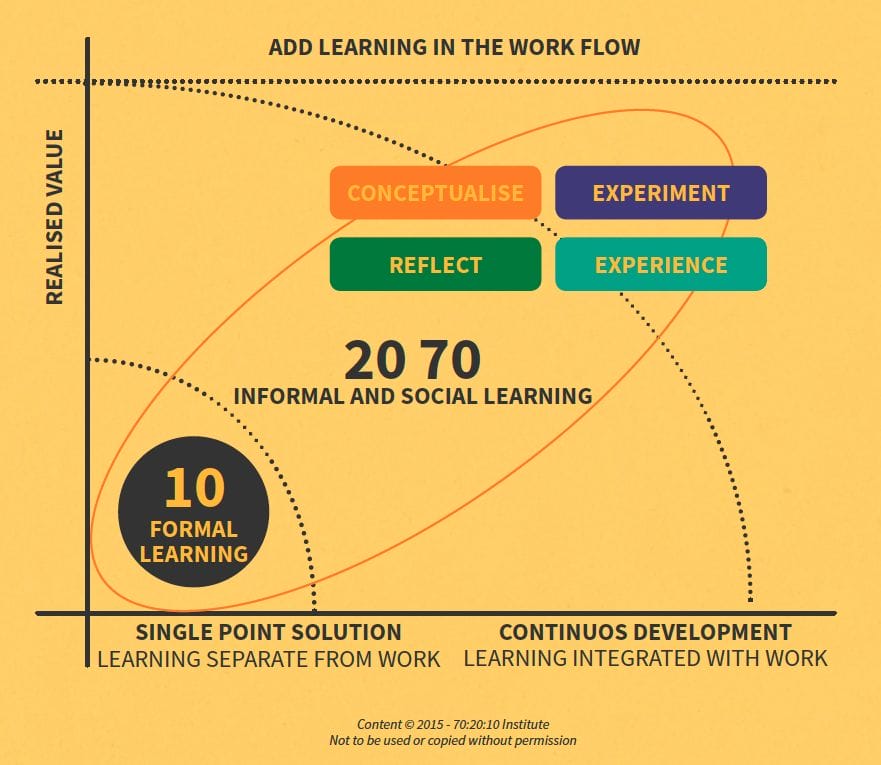
Learning and development (L&D) professionals are facing increasing forces of change, which are shaking up the traditional focus on formal learning. Central to this is a new understanding of the power of social and informal learning that is undoubtedly influencing the role L&D needs to play today.
Increasing pressure from leadership on L&D to deliver tangible value is demanding new and more effective solutions, with digital transformation at the top of everyone’s agenda and occupying the majority of L&D’s resources.
The obvious question in this environment now becomes: Is formal learning still relevant today?
This blog will dive into today’s L&D priorities and how this impacts formal learning strategies.
The State of the Industry
In its 2019 HR/L&D Trend Survey, The Ken Blanchard Companies identified more than 100 initiatives on which leadership, learning and talent development professionals are focusing.
Respondents identified six learning modalities they intend to explore/utilize:
- 33% plan to focus on learning at the point of work: related to 70/20/10 models and just-in-time learning focused on providing practical solutions to situations faced by employees in the moment.
- 33% plan to focus on adaptive learning: including using algorithms to orchestrate interaction with the learner to deliver customized resources and learning activities that address the unique needs of each learner.
- 31% plan to focus on digitization: including online learning, augmented reality, microlearning, adaptive learning, artificial intelligence and massive open online courses.
- 30% plan to focus on design thinking: defined as ‘a five-step solution-based approach to solving problems that is extremely useful in tackling complex issues that are ill-defined or unknown’.
- 29% plan to focus on peer mentoring: offering colleagues at a similar level in the organization an opportunity to learn from each other.
- 24% plan to focus on spaced learning: described as ‘highly condensed learning content that is typically repeated three times with two 10-minute distractive breaks’.
While the results of this survey suggest L&D professionals are looking at a broad range of approaches to meet existing and future demands, it’s obvious that all of these signal a shift away from formal learning.
Despite L&D’s intention to extend formal learning solutions, today’s world requires L&D to embrace informal learning in order to adapt to an ever-changing and fast-moving environment where learning and working are increasingly intertwined – and where learning from working is equally important, if not more so, than learning to work.
Learn more about the State of Online Learning For Enterprises in this whitepaper.
Bringing Working & Learning Together
Eric Kandel won the Nobel Prize for his work on learning and memory. Kandel describes learning as our ‘‘ability to acquire new ideas from experience and retain these ideas over time in memory’’. For Kandel, experience is the key trigger for learning.
One of today’s major challenges for L&D professionals is the need to reframe L&D roles to focus on enabling and supporting organizational performance. To do this, it means shifting focus from formal, content-rich learning away from the workflow to an integrated approach where learning is seen as a human benefit from continuous work improvement.
It is known that the closer to the point of use learning occurs, the more effective it is likely to be. This is shown in this graph from the book 702010 towards 100% performance.

Making the Move From Formal to Informal
Too much learning content relies on absorption instead of interaction. Learners read articles or watch hours of video made by someone else, then they’re tested on how much information actually sticks. That’s why most formal learning is considered to be too generic, too basic and too boring.
Informal and social learning is built around employees engaging with the training material—providing feedback, sharing knowledge and fueling organization-wide discussions.
With more of a role in the proceedings, learners will not only feel more immersed in the material, but they will also have a greater sense of ownership in what’s being taught. This can help eliminate the boredom issue and even improve worker retention.
Charles Jennings is the co-founder of The 70:20:10 Institute
Docebo Coach & Share is a module of the Docebo Learning Platform that empowers your learners to learn from their peers, social interactions and day-to-day, on-the-job experiences. Enabling learners to share their knowledge helps you as a learning administrator or manager identify subject-matter experts within your ranks, but it also centralizes important, user-generated knowledge capital in a way that amplifies its value across the organization.
Ready to make the move to informal and social learning experiences?
